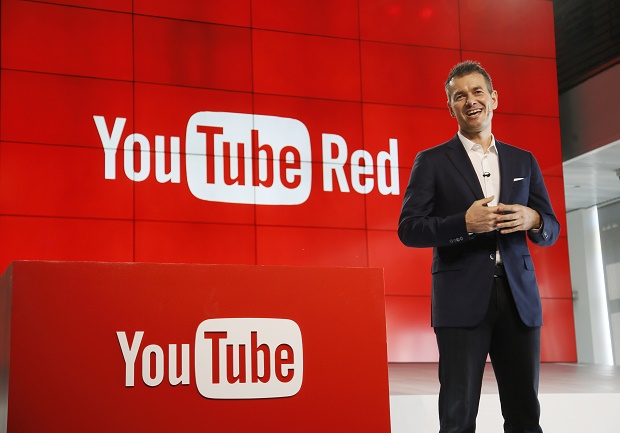
Robert Kyncl, YouTube Chief Business Officer, speaks as YouTube unveils “YouTube Red,” a new subscription service, at YouTube Space LA Wednesday, Oct. 21, 2015, in Los Angeles. The service combines ad-free videos, new original series and movies from top YouTubers like PewDiePie, and on-demand unlimited streaming music for $10 a month. AP Photo
NEW YORK, United States—YouTube on Wednesday announced a new paid subscription service that would eliminate advertisements as the video service behemoth looks to better tap its vast commercial potential.
YouTube, which is owned by search engine giant Google and claims more than one billion users worldwide, also announced an expanded music platform and original movies in a bid to encourage subscribers.
The new service, called YouTube Red, will offer commercial-free access for $9.99 a month starting on October 28. It will be available initially in the United States, with plans to roll it out worldwide in 2016.
YouTube Red will also let subscribers save videos to watch later on their computers or smartphones, even when they lack Internet connections.
The traditional YouTube site backed by commercials will remain available and free.
“YouTube Red marks an evolution in our desire to give fans more choice and features that they love and a much greater experience they’ve been asking for,” Robert Kyncl, YouTube’s chief business officer, told a launch event in Los Angeles broadcast to New York and San Francisco offices.
Originally created by three young entrepreneurs as a way to swap videos, YouTube was bought by Google for $1.65 billion in 2006 and is now the world’s third most visited website after Google itself and Facebook.
Dedicated music platform
YouTube also announced a new YouTube Music app, hoping to draw more dedicated users amid the rapid growth of music streaming.
While YouTube is notorious for its chaotic array of videos, YouTube Music—to launch at an unspecified date later this year—will function much like a streaming platform, with organized channels that provide videos of each artist.
YouTube Music will also carry an audio-only function aimed at the many users who want just the music while driving or exercising—a key conclusion reached by the company when it earlier ran a test platform called YouTube Music Key.
Kyncl credited YouTube with reviving music videos, making them a vital force for artists to promote their work.
“We want to take that to the next level and provide artists and fans a new way to connect,” he said, voicing hope that YouTube Music would become a “primary destination for music.”
Manuel Bronstein, the product management director, said that YouTube Music would offer all possible versions of a song, including covers by other artists and amateurs.
“In most music services you can listen to the album, you can listen to the track, but in YouTube Music you can do those two things and also watch a live video, the performance, the lyrics, the remixes, the versions that are a cappella,” he said.
Spotify remains the leader in music streaming, but newcomers Apple Music and Tidal have sought to win over users in part by highlighting video content.
YouTube Music will be free with commercials. Subscribers to Google Play Music, the parent company’s audio streaming service, will automatically receive YouTube Red and vice versa.
Exclusive content
In hopes of drawing subscribers to the paid tier, YouTube said it was developing movies and series exclusive to YouTube Red.
The original programming will initially focus on content from providers who have made their name on YouTube.
Lilly Singh, a Canadian comedian and motivational speaker who has won a following under the YouTube name Superwoman, will star in a movie entitled “A Trip to Unicorn Island.”
Other programming will include a singing contest called “Sing It!” and a romantic drama, “Single by 30,” by Asian American filmmakers Wong Fu Productions.
Kyncl said that YouTube would share the “vast majority” of its revenue with creative partners but declined to go into details.
YouTube has long come under fire from the music and other creative industries, who say that artists are rarely compensated for content uploaded from non-official sources.
RELATED STORIES
Twitter, YouTube, Instagram work on stealth advertising
Targeting: Why online ads work